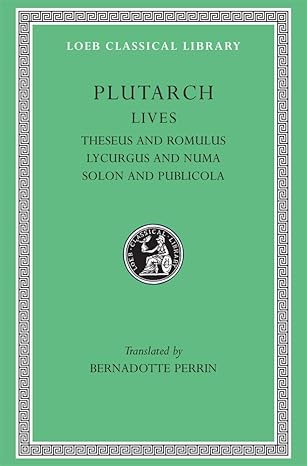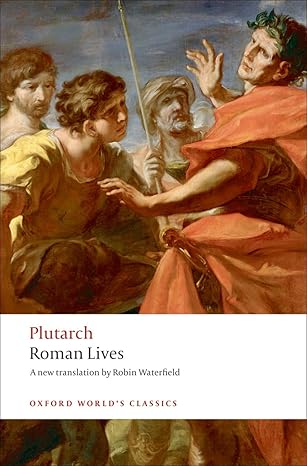Plutarch was born at Chaeronea, which is in present-day Greece, not far from Athens.
Original language: Greek.
I read some of Lives of the Noble Greeks and Romans (also called Parallel Lives). Of the 46 lives, I read the entirety of six – Theseus, Romulus, Lycurgus, Numa, Solon, and Publicola, and parts of two more – Cato the Elder and Aemilius Paullus.
I used two editions — the Loeb Classical Library edition (1914), translated by Bernadotte Perrin, and the Oxford World’s Classics edition of Roman Lives (1999), translated by Robin Waterfield.


From Perrin’s introduction to Lives, Volume I: “Greek was the language of literary and polite society at Rome.” Shakespeare used Sir Thomas North’s 1579 English translation of the first French translation of the Lives in Coriolanus, Julius Caesar, and Antony and Cleopatra.
I don’t like how Plutarch puts all the contradictory stories from his sources inline in the text, instead of in footnotes. It makes it confusing to read.
“For it is weakness, not kindness, that brings men into endless pains and terrors when they are not trained by reason to endure the assaults of fortune.” (Hamlet’s “To be or not to be” echoes that passage.).
I’m didn’t like Plutarch’s lives of the Greeks that much. I didn’t like his writing style. Sometimes he just chains one anecdote or story after another, with no overall thesis or story to connect them. And he dashes things off, he doesn’t go into detail like Livy.
Plutarch’s lives of the Gracchi, Marius, Sulla, and Pompey are a lot better. Page turners, in fact.
Really glad I read Plutarch’s Marius, Sulla, Pompey, and Caesar. A gripping account (if with a few historical inaccuracies) of the chaos that attended the collapse of the Roman Republic. Plutarch really hitting his stride.
Final Thoughts on Plutarch
I really enjoyed the Roman lives Marius, Sulla, Pompey, Caesar, and Antony, all translated by Robin Waterfield. The narratives were excellent and the lives were eventful, often shocking and violent. It was a turbulent period in Roman history. I can see why Shakespeare wanted to write plays about Caesar, Antony, and Cleopatra. Cleopatra herself is fascinating.
Leave a Reply